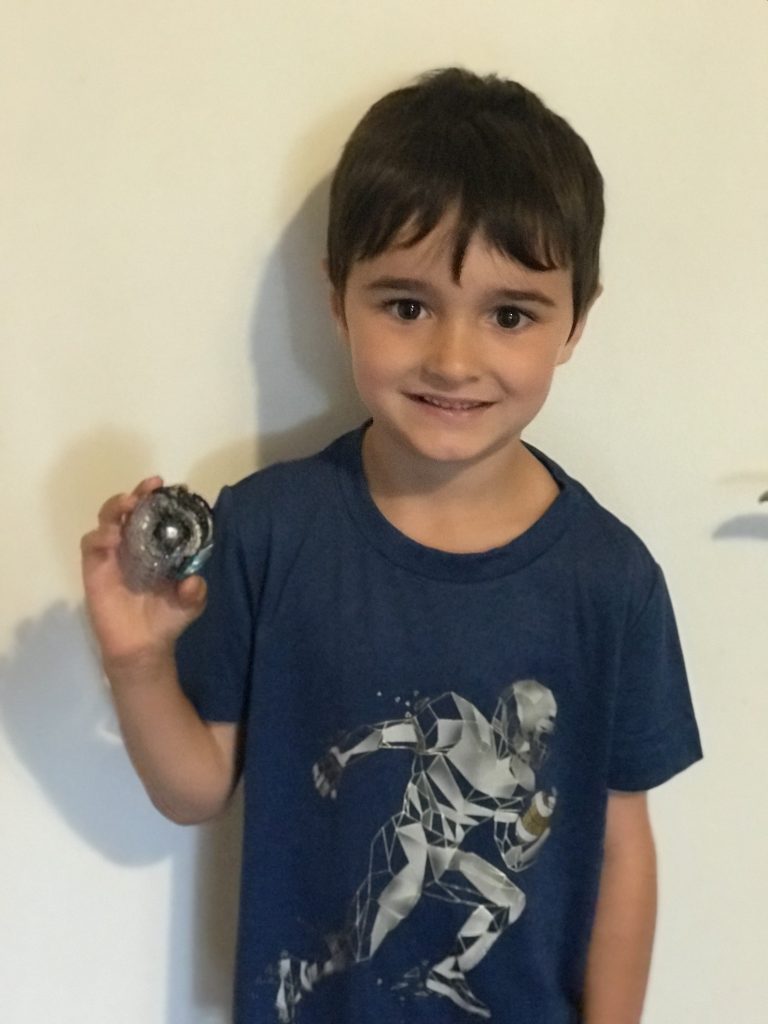Blake Bivens, Agency Development Field Specialist
Sometimes, as a parent, you get an opportunity to use your knowledge to educate your children. They clearly don’t always use that knowledge you have bestowed upon them, but when they do it’s definitely a check in the box for a good parenting day.
Recently, my wife and I had taken our 6-year-old, Joshua, to Target so he could look at the Beyblades. Beyblades are essentially spinning tops that battle in a cheaply made, handsomely priced plastic arena until one of the Beyblades breaks in half, and the match is over. Whatever happened to the days of wooden tops that just spun around and we could count to see how long we could get one to spin; these kids have it made! This kid was so excited because Target had 1 of the Beyblades he’d been wanting. He rushed home, opened his wallet, and quickly realized he was $6 short. He sat on his small trampoline, crying and saying, “I’ll never get the Beyblade now!”
We’ve all heard this, right? I brought him into the kitchen where we have his chore chart and walked him through the things he could do to get the money to buy his Beyblade. He is still crying at this point, but I had to get back to my work, so I left him with the usual dad comment, “Well Joshua, if you continue to cry and say you won’t get it, then you’ll be crying tomorrow and the next day and you really won’t get it. Or, you can do what I showed you and you can get it today. It’s now on you.”
Of course, he didn’t like that and he stormed off to his room. The funny thing is, once he got past the emotional, and thought about the game plan and his incentive, he began to work.
I would peak out of my office occasionally and see him carrying the trash can that he’d emptied, he ran the vacuum cleaner, he cleaned the cat litter box, fed the cat and dog(again), brushed his teeth (yes, we give them a quarter every time they brush their teeth…without us telling them). I know what you were thinking there, “They get paid to brush their teeth? Well, what if they don’t have that at the end of the week checked, does that mean they haven’t made their kids brush their teeth?” HAHA!! Maybe…
You see, what happened was I gave Joshua a game plan, he had the incentive in his mind, and with both of those came a positive deposit in his character development, and the ultimate goal was achieved. Agencies need these same principles.
If you feel like your agency has hit a point of stagnation, maybe everyone is unaware of their incentive to create new business for the agency, and no, just keeping their job isn’t the best way to think about your employees and believing “keeping their job” is incentive enough. It could also mean there is no extra incentive to round accounts, tell their neighbor about how you can help with their insurance, or even getting their family and close friends on board as clients.
Just like Joshua, everyone has the tendency to lose hope in their ability to do and get the things they want to in life, and dreams and goals that once seemed within reach slowly fade away. A staff that is not as productive as it once was is likely crying out much like Joshua, just not in such an obvious manner.
So sit down with your staff, during their annual review or today, find out what they are hoping to do with the income they are earning. Is their income enough to reach those dreams of that Hawaii or European vacation, pay for their kid’s college, or become debt-free? Can you help them reach their goal by creating a bonus structure, or a commission package, even for your service staff?
I think you’ll find if you take the time to learn their dreams and aspirations, and put a plan with incentives together for them to reach those, you’ll find your staff becoming more efficient, having a renewed sense of purpose, and maybe even watching the needle shift back to a growth stage in your agency.

I hope you’ll see this kind of smile once the day is done, and pictures of your employees’ greatest moments that you helped facilitate. These smiles are the best! These smiles are made possible by game plans, incentives, and agency development.

